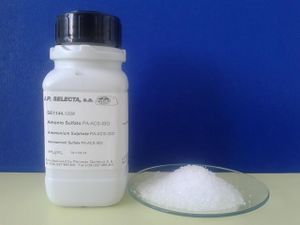Difference between revisions of "Ammonium sulfate"
| (One intermediate revision by the same user not shown) | |||
| Line 130: | Line 130: | ||
==Preparation== | ==Preparation== | ||
Ammonium sulfate can be prepared by reacting [[sulfuric acid]] with an excess of [[ammonia]] or [[ammonium bicarbonate]]/[[ammonium carbonate|carbonate]]: | Ammonium sulfate can be prepared by reacting [[sulfuric acid]] with an excess of [[ammonia]] or [[ammonium bicarbonate]]/[[ammonium carbonate|carbonate]]: | ||
| − | :H<sub>2</sub>SO<sub>4</sub> + 2 NH<sub>3</sub><sub>(aq)</sub> → (NH<sub>4</sub>)<sub>2</sub>SO<sub>4</sub><sub>(aq)</sub> | + | : H<sub>2</sub>SO<sub>4</sub> + 2 NH<sub>3</sub><sub>(aq)</sub> → (NH<sub>4</sub>)<sub>2</sub>SO<sub>4</sub><sub>(aq)</sub> |
| − | :H<sub>2</sub>SO<sub>4</sub> + 2 NH<sub>4</sub>HCO<sub>3</sub> → (NH<sub>4</sub>)<sub>2</sub>SO<sub>4</sub> + 2 H<sub>2</sub>O + 2 CO<sub>2</sub> | + | : H<sub>2</sub>SO<sub>4</sub> + 2 NH<sub>4</sub>HCO<sub>3</sub> → (NH<sub>4</sub>)<sub>2</sub>SO<sub>4</sub> + 2 H<sub>2</sub>O + 2 CO<sub>2</sub> |
| − | :H<sub>2</sub>SO<sub>4</sub> + (NH<sub>4</sub>)<sub>2</sub>CO<sub>3</sub> → (NH<sub>4</sub>)<sub>2</sub>SO<sub>4</sub> + H<sub>2</sub>O + CO<sub>2</sub> | + | : H<sub>2</sub>SO<sub>4</sub> + (NH<sub>4</sub>)<sub>2</sub>CO<sub>3</sub> → (NH<sub>4</sub>)<sub>2</sub>SO<sub>4</sub> + H<sub>2</sub>O + CO<sub>2</sub> |
==Projects== | ==Projects== | ||
| Line 165: | Line 165: | ||
[[Category:Easily prepared chemicals]] | [[Category:Easily prepared chemicals]] | ||
[[Category:Readily available chemicals]] | [[Category:Readily available chemicals]] | ||
| + | [[Category:Essential reagents]] | ||
Latest revision as of 15:13, 18 November 2023
 Ammonium sulfate bottle and sample.
| |
| Names | |
|---|---|
| IUPAC name
Ammonium tetraoxosulfate (VI)
| |
| Other names
Ammonium sulfate
Ammonium sulphate Diammonium sulfate Diazanium sulfate Actamaster Dolamin Mascagnite Sulfuric acid diammonium salt | |
| Properties | |
| (NH4)2SO4 | |
| Molar mass | 132.14 g/mol |
| Appearance | White solid |
| Odor | Odorless |
| Density | 1.769 g/cm3 (at 20 °C) |
| Melting point | 235 to 280 °C (455 to 536 °F; 508 to 553 K) (decomposes) |
| Boiling point | Decomposes |
| 70.6 g/100 ml (0 °C) 74.4 g/100 ml (20 °C) 76.4 g/100 ml(25 °C) 103.8 g/100 ml (100 °C) | |
| Solubility | Insoluble in acetone, diethyl ether and ethanol |
| Vapor pressure | 14 mm Hg (at 20 °C) |
| Acidity (pKa) | 5.5 |
| Hazards | |
| Safety data sheet | Fisher Scientific |
| Flash point | Non-flammable |
| Lethal dose or concentration (LD, LC): | |
| LD50 (Median dose)
|
2840 mg/kg, rat (oral) |
| Related compounds | |
| Related compounds
|
Ammonium bisulfate |
| Except where otherwise noted, data are given for materials in their standard state (at 25 °C [77 °F], 100 kPa). | |
| Infobox references | |
Ammonium sulfate (IUPAC name ammonium tetraoxosulfate (VI)) or ammonium sulphate, is an inorganic salt with the formula (NH4)2SO4, commonly used as a fertilizer and in biochemistry in the separation of proteins.
Contents
[hide]Properties
Chemical
When ammonium sulfate is mixed with a soluble calcium salt, calcium sulfate precipitates.
- (NH4)2SO4 + CaCl2 → 2 NH4Cl + CaSO4
- (NH4)2SO4 + Ca(NO3)2 → 2 NH4NO3 + CaSO4
- (NH4)2SO4 + Ca(CH3COO)2 → 2 CH3COONH4 + CaSO4
Physical
Ammonium sulfate is a white solid, soluble in water and insoluble in organic solvents. It is odorless and has a saline taste. Its density is 1.769 g/cm3 at 20 °C.
Availability
Ammonium sulfate is sometimes available as a fertilizer, either pure or mixed with other additives.
Some chimney cleaning powders contain a mixture of ammonium sulfate, ammonium chloride and other additives. Ammonium sulfate can be extracted from the mixture via recrystallization from water.
Lastly it can be bought from chemical suppliers and online.
Preparation
Ammonium sulfate can be prepared by reacting sulfuric acid with an excess of ammonia or ammonium bicarbonate/carbonate:
- H2SO4 + 2 NH3(aq) → (NH4)2SO4(aq)
- H2SO4 + 2 NH4HCO3 → (NH4)2SO4 + 2 H2O + 2 CO2
- H2SO4 + (NH4)2CO3 → (NH4)2SO4 + H2O + CO2
Projects
- Salt out proteins
- Make Mohr's salt (ammonium iron(II) sulfate)
- Make ammonium nitrate
Handling
Safety
Ammonium sulfate poses little toxicity and no special protective equipment is required when handling it.
Storage
Should be kept closed bottles or bags.
Disposal
No special disposal is required. Discard it as you wish.